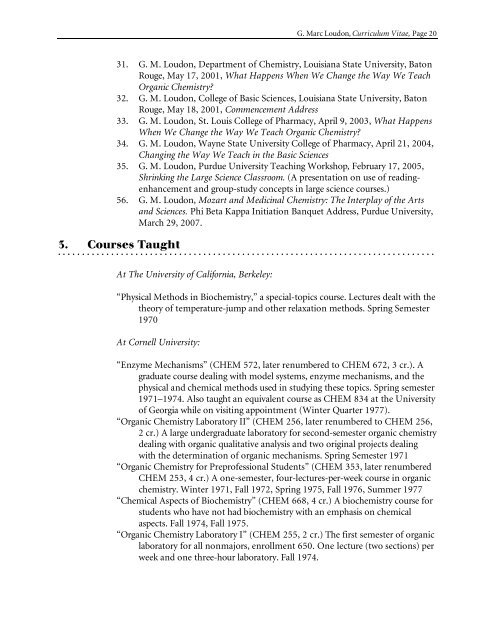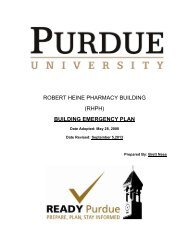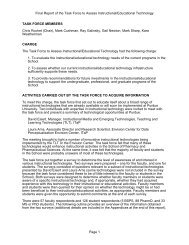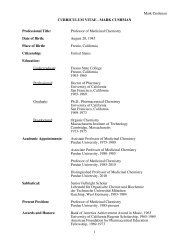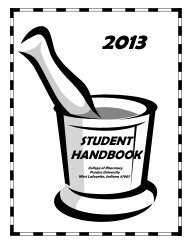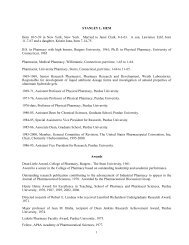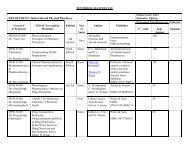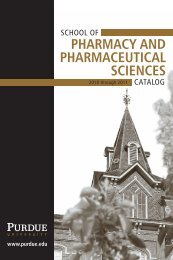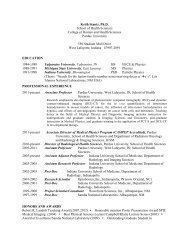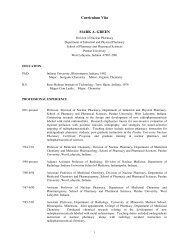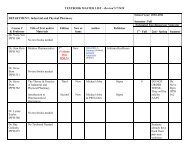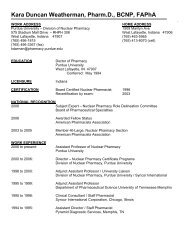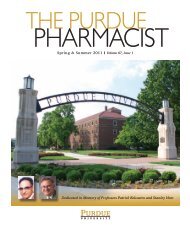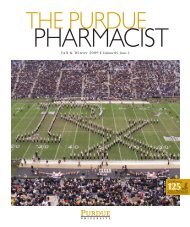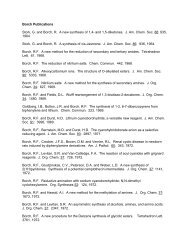Gordon Marcus Loudon - Purdue College of Pharmacy - Purdue ...
Gordon Marcus Loudon - Purdue College of Pharmacy - Purdue ...
Gordon Marcus Loudon - Purdue College of Pharmacy - Purdue ...
You also want an ePaper? Increase the reach of your titles
YUMPU automatically turns print PDFs into web optimized ePapers that Google loves.
G. Marc <strong>Loudon</strong>, Curriculum Vitae, Page 20<br />
31. G. M. <strong>Loudon</strong>, Department <strong>of</strong> Chemistry, Louisiana State University, Baton<br />
Rouge, May 17, 2001, What Happens When We Change the Way We Teach<br />
Organic Chemistry?<br />
32. G. M. <strong>Loudon</strong>, <strong>College</strong> <strong>of</strong> Basic Sciences, Louisiana State University, Baton<br />
Rouge, May 18, 2001, Commencement Address<br />
33. G. M. <strong>Loudon</strong>, St. Louis <strong>College</strong> <strong>of</strong> <strong>Pharmacy</strong>, April 9, 2003, What Happens<br />
When We Change the Way We Teach Organic Chemistry?<br />
34. G. M. <strong>Loudon</strong>, Wayne State University <strong>College</strong> <strong>of</strong> <strong>Pharmacy</strong>, April 21, 2004,<br />
Changing the Way We Teach in the Basic Sciences<br />
35. G. M. <strong>Loudon</strong>, <strong>Purdue</strong> University Teaching Workshop, February 17, 2005,<br />
Shrinking the Large Science Classroom. (A presentation on use <strong>of</strong> readingenhancement<br />
and group-study concepts in large science courses.)<br />
56. G. M. <strong>Loudon</strong>, Mozart and Medicinal Chemistry: The Interplay <strong>of</strong> the Arts<br />
and Sciences. Phi Beta Kappa Initiation Banquet Address, <strong>Purdue</strong> University,<br />
March 29, 2007.<br />
3. Courses Taught<br />
· · · · · · · · · · · · · · · · · · · · · · · · · · · · · · · · · · · · · · · · · · · · · · · · · · · · · · · · · · · · · · · · · · · · · · · · · · · · · ·<br />
At The University <strong>of</strong> California, Berkeley:<br />
“Physical Methods in Biochemistry,” a special-topics course. Lectures dealt with the<br />
theory <strong>of</strong> temperature-jump and other relaxation methods. Spring Semester<br />
1970<br />
At Cornell University:<br />
“Enzyme Mechanisms” (CHEM 572, later renumbered to CHEM 672, 3 cr.). A<br />
graduate course dealing with model systems, enzyme mechanisms, and the<br />
physical and chemical methods used in studying these topics. Spring semester<br />
1971–1974. Also taught an equivalent course as CHEM 834 at the University<br />
<strong>of</strong> Georgia while on visiting appointment (Winter Quarter 1977).<br />
“Organic Chemistry Laboratory II” (CHEM 256, later renumbered to CHEM 256,<br />
2 cr.) A large undergraduate laboratory for second-semester organic chemistry<br />
dealing with organic qualitative analysis and two original projects dealing<br />
with the determination <strong>of</strong> organic mechanisms. Spring Semester 1971<br />
“Organic Chemistry for Prepr<strong>of</strong>essional Students” (CHEM 353, later renumbered<br />
CHEM 253, 4 cr.) A one-semester, four-lectures-per-week course in organic<br />
chemistry. Winter 1971, Fall 1972, Spring 1975, Fall 1976, Summer 1977<br />
“Chemical Aspects <strong>of</strong> Biochemistry” (CHEM 668, 4 cr.) A biochemistry course for<br />
students who have not had biochemistry with an emphasis on chemical<br />
aspects. Fall 1974, Fall 1975.<br />
“Organic Chemistry Laboratory I” (CHEM 255, 2 cr.) The first semester <strong>of</strong> organic<br />
laboratory for all nonmajors, enrollment 650. One lecture (two sections) per<br />
week and one three-hour laboratory. Fall 1974.


